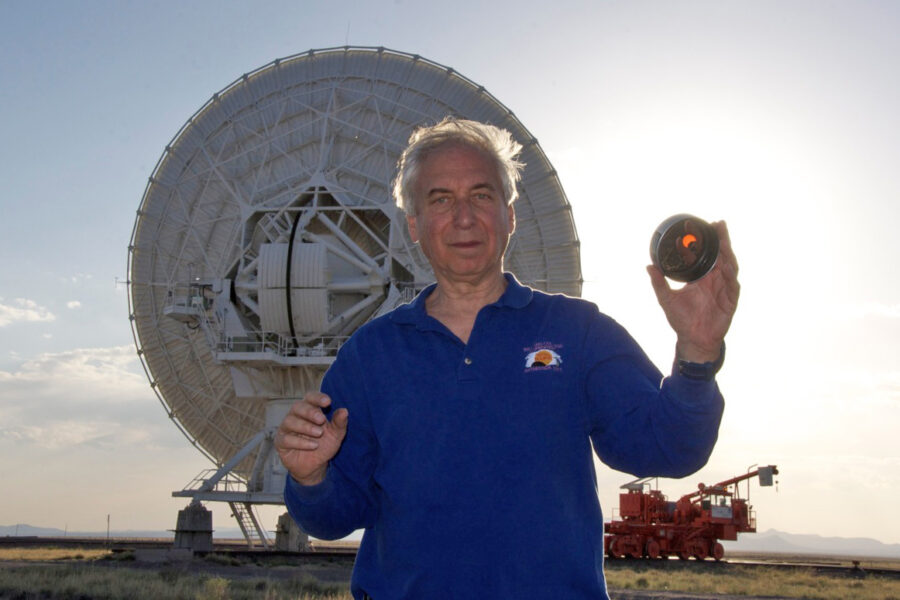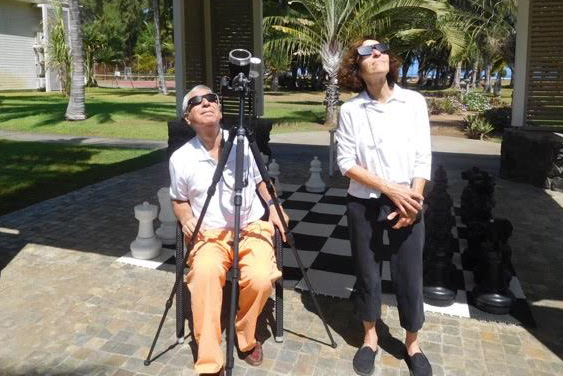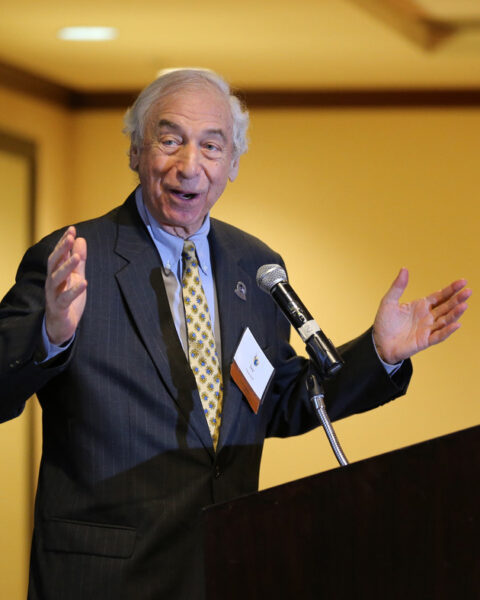Jay M. Pasachoff, Chair of the Astronomy Department, Director of the Hopkins Observatory, and Field Memorial Professor of Astronomy at Williams College in Williamstown, Massachusetts, succumbed to cancer on Sunday morning, November 20th. Pasachoff was renowned for his research on the solar corona, his many books and magazine articles, and his studies of asteroid occultations and transits of Mercury and Venus across the Sun.
Only his doctors, family members, and closest friends knew he was sick, so his death came as a shock to his many colleagues, students, and acquaintances around the world. Some of us who saw him at the June 2022 meeting of the American Astronomical Society in Pasadena, California, noticed that he looked somewhat frail, but who wouldn’t at age 79 after two years of isolation forced by the COVID-19 pandemic? We know now what we didn’t know then.

Jay Pasachoff / Williams College
Pasachoff was probably best known as one of the world’s foremost eclipse chasers. He experienced his first totality while an undergraduate at Harvard University, where he accompanied astronomer Donald H. Menzel on a flight to intercept the Moon’s shadow off the coast of Massachusetts. Over the next six decades he traveled to 74 more solar eclipses, eventually catching 36 totals, 19 annulars, and 20 partials. He had planned to travel to Finland for last month’s partial eclipse but canceled the trip at the last minute when his health took a turn for the worse. Even so, according to Bill Kramer and Andreas Möller’s international eclipse-chasers log, Pasachoff ranks #2 by number of solar eclipses of all types, #1 by number of totals, and #3 by cumulative time in the Moon’s umbra.
After completing his bachelor’s, master’s, and PhD degrees in astronomy at Harvard and doing postdoctoral research there and at Caltech, Pasachoff settled into what would become a 50-year career as a professor at Williams College. He famously brought students along with him on his eclipse expeditions, which weren’t just for fun but to gather photometric and spectroscopic data on the inner corona. I once asked Jay why he bothered to chase partial solar eclipses in far-off, often hard-to-reach places. He said it was good practice for him and his students so that they’d be experts on their equipment and observing plans when they went to the next total solar eclipse and executed those plans for real under intense time pressure. Quite a few those former students are now astronomy professors at other institutions, which delighted Jay.

Jay Pasachoff / International Astronomical Union
Jay was prolific in both research and writing. In addition to his textbooks, trade books, research papers, and popular articles, he wrote book reviews for many publications and numerous letters to the editors of Sky & Telescope, the New York Times, and the journals Nature and Science, occasionally pointing out errors but more often adding historical context or scientific insight about something that appeared in a recent issue.
Jay was also extremely generous. He was active in many professional organizations, including the International Astronomical Union (IAU), the American Association for the Advancement of Science (AAAS), and the American Astronomical Society (AAS), including its Historical Astronomy, Solar Physics, and Planetary Science divisions. He was elected to leadership positions in most of those groups and named Fellow of the AAS, AAAS, American Physical Society, and Royal Astronomical Society. Jay and his wife Naomi regularly welcomed colleagues, students, and friends into their home and treated them like family. The IAU named asteroids for both of them: 5100 Pasachoff and 68109 Naomipasachoff.

Astronomical Society of the Pacific
Among his many other honors, Jay received the AAS Education Prize in 2003 “for his eloquent and informative writing of textbooks from junior high through college” and the Astronomical Society of the Pacific’s Klumpke-Roberts Award in 2019 “for outstanding contributions to the public understanding and appreciation of astronomy.”
My favorite memories of Jay involve travel back to Massachusetts from an AAS meeting in the 1990s and the IAU General Assembly in Beijing, China, in 2012. On both occasions, Jay noticed me waiting for the same flight to Boston that he was on. He asked about my seat assignments, then took my boarding passes to the gate agent and returned a few minutes later with new boarding passes reflecting upgrades from coach to the seat next to him in business class! Our conversations on those two flights were animated and enjoyable, touching on topics in science, history, culture, politics, and the arts. Jay was interested in, and knowledgeable about, so many things, and I learned so much from my interactions with him over the decades.
Looking at the tributes and remembrances pouring in to my in-box from all over the world, it’s clear that “he will be missed” is woefully inadequate to fill the hole left by Jay’s passing. I’m sure I won’t be alone in raising a bottle of Corona beer to toast Jay’s memory at the next solar eclipse.
References:
https://astronomy.williams.edu/profile/jmp/
https://www.nytimes.com/2022/11/20/obituaries/jay-pasachoff-dead.html
https://sites.williams.edu/solar-corona/
 1
1
Comments
Deepak-D
October 27, 2023 at 9:25 pm
Sad to see him go. I used to love reading his books on Astronomy. He will be missed and always remembered.
You must be logged in to post a comment.
You must be logged in to post a comment.